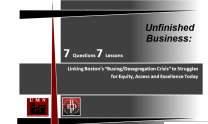Do words and phrases have genders? What type of people come to mind when the word “war” comes up? How about “sewing circle”? And which one of these do we take seriously? One is organized violence, the other is organized labor. One has countless books and movies, as well as trillions of dollars, dedicated to its analysis and propagation each year. The other is often used in this part of the world as a way to trivialize a group of women socializing with one another. War, despite its unimaginable cost to women and children throughout history, is seen as an exclusively male endeavor. Sewing circles are, as mentioned, a female space. War is destruction by unquestioning soldiers carrying out unquestioned orders. Sewing circles are constructive– not just for the clothing and other articles they produce or mend, but also for the so-called “gossip.” Not to idealize the concept, but socializing in a circle provides a space for an exchange of news and ideas, as well as the time and space for reflection and thoughtfulness. War is seen as a measure of strength. Sewing circles have become a metaphor for pointlessness.
More than a few times since I’ve been involved in the “social justice” non-profit world have I heard meetings described as sewing circles, which not only deride the stated purpose of whatever meeting but also the people participating in it, who are often women. Planned actions, on the other hand, are often framed in war language. “Battles”. “Going on the offensive”. What this adds up to, to me, is the feminization of reflection as a way to discredit it. It plays into traditionally patriarchal notions of leadership and organizing which value speed, hierarchy, and force. It also frames thoughtfulness, slowness, and deliberation as inefficient and wasteful. It reflects the values of the mass culture we live in, where characteristics associated with women– such as gentleness and openness– are seen as unfit for grappling with or wielding power.
It is important to see what this means for those of us doing social justice work. When reflection is feminine, and the feminine is despised, we cut ourselves off from a deep source of individual and collective power. Any discussion of freedom is meaningless if we do not have the freedom to process what is happening to ourselves and the people around us. If we can’t, or won’t, do that, then all we have at our disposal are unexamined ideas given to us through education– an education provided largely by school systems which have been seen as broken as long as they’ve existed, by a media system controlled by a few large corporate monoliths, and by our communities that are often both products and survivors of trauma. Without real, rigorous reflection, it is difficult to do anything through our work except reproduce or escalate the existing conditions.
For two years, this Project held story circles across Boston, inviting neighborhood residents to come into our circle and share their experiences with desegregation. Often, when people told their stories, they would begin by trying to fit their personal details into an already established narrative. For example, that “busing ruined the city” or that “both sides experienced hatred”. Not to say that these are false or wrong narratives, but no matter how “true” they are, they are also the entrenched ones that have allowed patterns of inequity to persist. As their stories went on, though, and they tried to follow both threads (their personal story and the larger narrative) to their ends, you would often see people struggle, or they would start sentences and then trail off. Words would fail them. It was like they had come up against a brick wall. They had reached the limits of both their personal story and the larger narrative. And here was where, in a quiet circle with no interruption, we saw a variety of reactions. Some people would just stop and cede the floor, or get frustrated, or persist and find some new piece of knowledge. Any route can potentially offer opportunities for reflection for both the person telling the story and the people listening. It allows us to see how firmly in place the established narratives are and how challenging it is to uproot them, even if our personal experience tells us they are insufficient. It allows us each to build and play off of one another’s stories, to see things in our own histories we never saw before, and to further our understanding of our place in a larger history.
Learning is an uncomfortable process. It is a struggle. It brings up feelings of uncertainty, vulnerability, and weakness. These are characteristics associated with the feminine. But it does us no good to ignore these feelings. In fact, those are the spaces where the most work can be done, because they are also the places where the entrenched narratives steer us from and don’t want us to go. We need to sit there and examine them individually and collectively so that we can work towards the kind of “two-sided transformations” that longtime activists and leaders James and Grace Lee Boggs believed were necessary, where, through our persistence, we transform both our institutions and ourselves.


Thanks for that thoughtful piece. I agree with everything in it, but would add that we also need the active, assertive, sometimes confrontational processes like demonstrations, strikes and so on. Maybe you could say we need both masculine and feminine, or maybe you could throw those terms out the window – but we need both. I don’t think you disagree, just wanted to add it.
Emily, the comment is appreciated. I definitely left some things out here, but, yes, I agree with you. We need both. Not only do we need both, but they need to be working in coordination with each other. Effective action, I think, comes out of deep reflection on what is needed, the obstacles in the way, and the conditions present, but often we find ourselves having to make an either/or choice. My focus on reflection in the post comes out of me trying to engage with patterns I’ve seen in my own personal life as well as the nonprofit circles I work in– patterns of what gets to be seen (and funded) as important work and what is dismissed as trivial, and why. That’s why I don’t want to throw away the masculine/feminine lens– I think we need to deconstruct it further and see how it reproduces the conditions that hinder us.